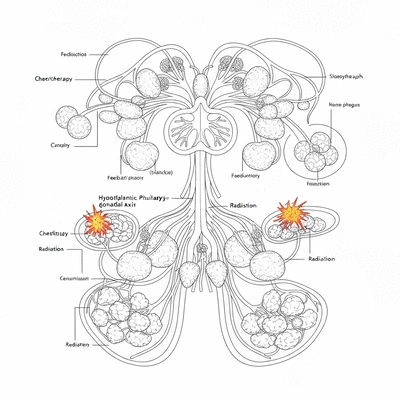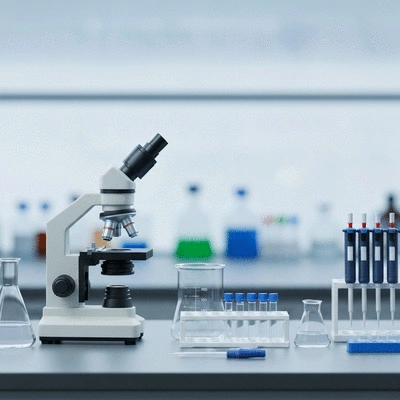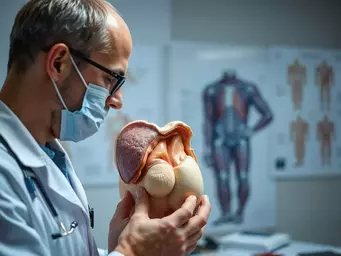Prevalence & Symptoms
Testosterone deficiency affects up to 30% of men undergoing cancer treatments.
- Fatigue
- Mood Swings
- Reduced Libido
- Difficulty Concentrating
What if the very treatments designed to save lives also impacted your quality of life in unexpected ways? This is a crucial question for cancer patients as they navigate the complexities of treatment and recovery.
This visual summarizes the prevalence, treatments, and side effects related to hypogonadism in cancer patients, highlighting the critical areas of concern.
Testosterone deficiency affects up to 30% of men undergoing cancer treatments.
Cancer treatments can disrupt the hypothalamic-pituitary-gonadal axis.
Symptoms often linked to hormonal imbalances post-treatment:
Proactive engagement for managing hormonal health:
When we think about cancer treatments, we often focus on their immediate effects. However, a significant concern for many cancer patients is the connection between these treatments and hypogonadism, or testosterone deficiency. This condition can lead to a myriad of health issues, including fatigue, mood changes, and decreased libido. Understanding how cancer treatments affect the hormone levels in our bodies is crucial for patients navigating their health journeys.
Hypogonadism can arise from the disruption of the hypothalamic-pituitary-gonadal axis, a system that regulates hormone production. In cancer patients, this axis may be affected by the disease itself or by the treatments employed, as detailed in research on the endocrine side effects of cancer therapies. As I often emphasize at Hypogonadal Health, awareness of these changes allows patients to advocate effectively for their health and seek appropriate interventions.
Hypogonadism is prevalent among cancer patients, and its implications can significantly impact quality of life. Studies have shown that testosterone deficiency can affect up to 30% of men undergoing various cancer treatments, a figure supported by numerous clinical observations. This statistic alone underscores the importance of recognizing the signs and symptoms early on. Some of the common symptoms include:
Understanding these symptoms is the first step toward managing one's health post-cancer treatment. It's essential to engage with healthcare professionals who can provide insights and tailored approaches to address these hormonal changes.
Various cancer treatments can lead to hormonal imbalances, particularly affecting testosterone levels. The most common types include:
Each of these treatments comes with its own set of potential side effects that can exacerbate the symptoms of hypogonadism. By understanding how these therapies affect hormonal health, patients can make informed decisions about their treatment pathways.
Patients undergoing chemotherapy and radiation therapy often experience a range of side effects that can be linked to hormonal imbalances. Common side effects include:
These side effects not only diminish the quality of life but can also lead to long-term challenges related to hypogonadism. As a dedicated endocrinologist, I encourage patients to discuss these issues with their healthcare providers. Having open conversations about hormonal health can lead to proactive management strategies that enhance overall well-being during and after cancer treatment.
Have you ever felt uncertain about discussing your hormonal health with your healthcare provider? You're not alone. Many patients hesitate to bring up concerns like fatigue or mood changes, but these conversations are crucial. Remember, your healthcare team is there to support you. Don't hesitate to ask questions and express your concerns—your health and well-being depend on it!
Here are some common questions patients and their families often have about the link between cancer treatments and testosterone deficiency.
As we've explored, there is a significant connection between cancer treatments and testosterone deficiency, which is critical for both patients and healthcare providers to understand. The effects of chemotherapy, radiation, and targeted therapies can lead to hormonal imbalances that may manifest as hypogonadism. By being aware of these connections, we can better manage the health and well-being of cancer survivors.
Recognizing the potential for testosterone deficiency is essential in ensuring that survivors receive comprehensive care. This awareness is supported by growing evidence, including studies on the prevalence of hypogonadism in cancer patients, and helps to highlight the need for regular monitoring of hormonal levels and proactive management strategies. Let’s summarize the key insights we've discussed:
By understanding these factors, we can foster a supportive environment that encourages open dialogue about hormonal health in the oncology setting. Have you considered how these insights might apply to your own situation or that of someone you know?
Now that we've covered the implications of cancer treatments on hormonal health, what can patients do next? It's crucial for cancer survivors to engage actively with their healthcare providers to monitor and address any hormonal imbalances. Here are some actionable steps to consider:
By fostering this collaboration, patients can take charge of their health and advocate for their needs effectively. Remember, your voice is powerful in healthcare decisions—don’t hesitate to share your experiences!
The journey toward understanding the relationship between cancer treatments and hormonal health is ongoing. New therapies, such as Selective Androgen Receptor Modulators (SARMs), are emerging and show promise in addressing testosterone deficiencies without the same risks as traditional treatments. Research published in the Frontiers in Endocrinology journal provides further insights into these advancements, indicating that it’s essential that ongoing research and clinical studies continue to explore these avenues.
As patients and providers, we must stay informed about the latest advancements in hormonal health. The European Journal of Endocrinology provides valuable research on this topic, offering a deeper understanding of the challenges and potential solutions. Consider these future directions:
Staying engaged with evolving research not only empowers healthcare providers but also enhances the quality of life for patients navigating the complexities of cancer treatment. Are you ready to discuss how these developments might affect your treatment plan or that of a loved one?
Clinical trials play a vital role in advancing our understanding and treatment of hypogonadism in the context of cancer care. By participating in these studies, patients can contribute to the body of knowledge that shapes future treatment protocols. It's also an opportunity to access cutting-edge therapies that may not yet be widely available.
For healthcare providers, incorporating evidence-based practices into patient care is crucial for improving outcomes. This means staying up-to-date with the latest research and integrating findings into clinical decision-making. Together, we can work towards a future where hormonal health is a priority in cancer survivorship.
Here is a quick recap of the important points discussed in the article:



 What if the key to unlocking your vitality lies in understanding the hormones that influence your bo
What if the key to unlocking your vitality lies in understanding the hormones that influence your bo
 Recognizing that your environment can significantly influence your hormonal health is crucial. Have
Recognizing that your environment can significantly influence your hormonal health is crucial. Have
 Have you considered how fluctuations in your testosterone levels might affect your daily energy and
Have you considered how fluctuations in your testosterone levels might affect your daily energy and
 Trauma to the testicles can have profound effects on hormonal health, but understanding the causes a
Trauma to the testicles can have profound effects on hormonal health, but understanding the causes a